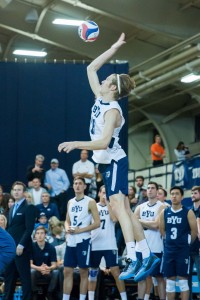
A volleyball player jumps to serve the ball but hits it out. A great player might dwell on the mistake and hit the second serve out as well. An elite athlete would shake it off, visualize placing the second serve in-bounds and then do so. The difference between the great athlete and the elite athlete: mental toughness.
Volleyball is a sport known for its fast pace and sudden momentum shifts, requiring BYU teams and athletes everywhere to be mentally tough in order to compete at the elite level.
“(The game has) evolved and everyone works out hard and everyone weight trains, so the mental thing is your leg up on everyone else,” senior BYU outside hitter Alexa Gray said.
Rachael Dixon, a sports psychology consultant and professor at National University in Carlsbad, California, played middle blocker at Seattle Pacific University. She said volleyball is a particularly tough sport mentally because of the motor movements involved. Volleyball players have to go back and forth between fine motor movements and dynamic, explosive motor movements.
“Athletes have to be able to shift their body very quickly and then while they do that, they have to be strategic,” Dixon said.
Volleyball players must be methodical in where they place the ball and decide where to do so while moving, oftentimes in less than a second. The body reacts to thoughts and that’s why the mind-body connection is so important.
“Putting yourself in the right mindset governs how your body’s going to respond,” Dixon said.
She said brains also govern emotions, which directly impact the chemical responses in the brain. Chemical reactions may include how we breathe, see, move or make decisions. Players respond differently to emotions of fear or anxiety than they do when feeling calm or peaceful.
Dixon coached senior BYU men’s volleyball players Robbie Sutton and Matt Underwood in high school. Senior setter Sutton believes in pregame visualization as a way to mentally prepare for games. He likes to watch five minutes of YouTube videos of professional setters and then visualize himself doing those same things out on the court. Being mentally tough helps him handle the pressure that comes in game situations.
“I put a lot of pressure on myself, especially as a setter; I’m involved in every single play and so mentally, I can’t take a play off,” Sutton said.

Senior setter Camry Godfrey Willardson of the BYU women’s volleyball team stays mentally tough by focusing on the present. She maintains a can-do attitude and when an error happens, looks to the next ball or next play.
“I thrive off of just living in the moment,” Willardson said.
Senior middle blocker Michael Hatch is taking a performance psychology class this semester and has learned to be more positive when evaluating his play. He keeps a performance journal where he follows a 3:1 ratio of three things he did well in practice and one area in which he wants to improve.
“I’m definitely more positive, (seen) more improvement,” Hatch said. “It helps me to be more positive and that’s when you’re going to improve faster.”
Hatch likes seeing his progress as areas he’s worked on have become strengths and he can switch his focus to improving another area of play.
Mental toughness is a lifelong skill elite athletes can apply to other stressful and high-pressure situations. Sutton relied on his mental strength during a month-long interview process, including a three-hour interview. Hatch did the same in his financial banking internship over the summer and was able to focus and work for extended periods of time.
“What’s cool about mental toughness, is it’s not just when you’re on the volleyball court,” Willardson said. “It’s in the classroom, it’s when you’re taking tests. It’s every day.”




